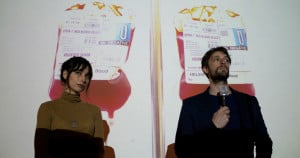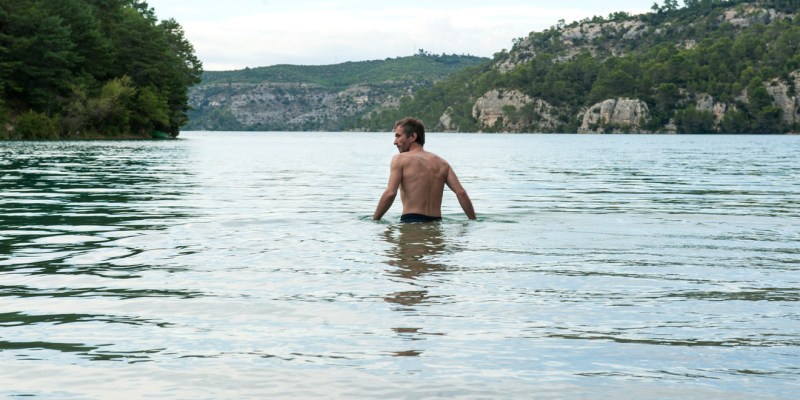PAs the San Francisco International Film Festival came to a close yesterday, I was able to catch two more films before they left town for good. Surreal and unusual, both films — Thomas Salvador’s “Vincent” and Rania Attieh and Daniel Garcia’s “H.” — offer unique perspectives uncommon even among festival fare.
“Vincent”
Despite the sheer quantity of works being produced in the genre, the modern superhero film is surprisingly formulaic. I don’t mean to imply that all of these films are identical, but few challenge the “save the world” model, so seamlessly perfected by studio giants Marvel and DC. In this regard, Thomas Salvador’s “Vincent” is both a blessing and a curse. First-time director Salvador smartly disregards the many conventions of the comic book narrative, but the end product is regrettably tedious, fairly colorless and utterly drab.

Though Vincent (Thomas Salvador) may have “superpowers” (and I assure you I use that phrase quite loosely) he is, for all intents and purposes, an ordinary guy. Shy, slim and superficially insignificant, Vincent spends the early half of the film looking for work, striving to make end’s meet. In between brief stints as a laborer on various construction sites, Vincent retreats to the river to bathe. There, drawing power from the surrounding water, he becomes extraordinarily strong — able to pierce through the water like a sailboat. And — so long as he remains wet — Vincent can even bring these abilities to the land, where he breaks coins, performing stunts and tricks to win a young woman’s heart (Vimala Pons).
Their courtship is brief but inspired: In one scene, she resolves to give him the “longest caress,” snaking her naked body across his unclothed form. It’s a brilliant moment — the camera tracing the perfect symmetry of their bodies — but it’s also the only moment that leaves any sort of genuine impression during the film’s 80-minute run time.
Once Vincent falls in with Lucie (the girl), Salvador does not seem to know what to do with the narrative. Vincent goes about trivial tasks — mowing the lawn, sun tanning on the dock — and, for a while, the film doesn’t really go anywhere. Then Vincent does something vaguely criminal (I’m still not entirely sure what) and is pursued by the authorities. Some low budget chase scenes ensue, and then, just as quietly as it began, “Vincent” fades into black.
It’s all rather contrived, like a supernatural “Bicycle Thieves,” wholly lacking of a narrative spine, and all too ready to abandon it’s minimalism for a stupid and unnecessary chase through the streets (with all sorts of crummy effects). Salvador is good as Vincent (the character) — quiet and kindly — but “Vincent” (the film) doesn’t really amount to anything more than a forgettable traipse through nothingness.
The concept is wonderfully original — a superhero film where the hero simply mows the lawn and flirts — but the inexperienced Salvador doesn’t seem to know how to harness the originality of the central conceit.
“H.”

Seemingly weightier than the wafer-thin “Vincent,” Rania Attieh and Daniel Garcia’s “H.” is a cinematic tangle of unanswered questions. Doors open, but are left unexplored. Novel plots emerge with frequency, before dying with little explanation and even less logic. Some sort of weird love child between Shane Carruth’s “Upstream Color” and a cloud of mist, “H.” is like a lullaby for which you do not, nor will you ever, know the words: hypnotic, beautiful, but altogether infuriating.
For the most part, “H.” depends upon two similar narrative threads. There is Helen (Robin Bartlett), an aging old woman whose sole companion is not her husband Roy (Julian Gamble), but a small plastic doll, which Helen nourishes as if it was a live infant. And then there’s Helen number two (Rebecca Dayan), an artist who yearns for the birth of her baby, but is certain that her lover will leave once the child is born. Both seem to be in crisis, unsure how to connect with their male companions.
Then, a meteor explodes above Troy, New York, and things start to get wonky for the Helens. Some townsfolk start slipping into walking comas (i.e. staring at a wall). Others just disappear altogether. And although the two Helens are unaffected at first, the crazy is clearly in the water, for, before long, both women begin to eerily lose touch with the physical world.
A giant stone head starts floating down the river, a Minotaur appears in broad daylight: When the meteor strikes, “H.” becomes an exercise in Carruth-ian cinematography. With a pallete of wispy grey tones and coarse, earthy, browns, Garcia’s work is a singular pleasure. There is a certain ephemerality to his sumptuous visuals: Each image seems only seconds away from fading into oblivion. The result is dream-like and beautiful. In this respect, “H.” is an intangible specter, momentarily captured yet frustratingly fleeting.

Unfortunately, atmosphere cannot sustain a film and in their effort to entrance, Attieh and Garcia render the material inaccessible. Why does a horse wander through the frame when Helen number two gets out of her car? Perhaps there is some veiled symbolism in the mare’s appearance, but it seems more likely that Attieh and Garcia just thought the image of a black horse on white snow would look cool. The horse is striking, yes, but what Attieh and Garcia don’t seem to understand is that this moment is also immeasurably perplexing. Why does the image become pixelated when Helen number one is running through the forest? I honestly don’t know. Everything in “H.” is a mystery: no answers, just questions.
“H.” may be a trip, but it’s bittersweet.
Contact Will Ferrer at wferrer ‘at’ stanford.edu
